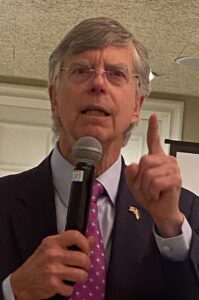Below is a list of some recent topics and speakers who have visited the Wichita Committee on Foreign Relations in 2023-24:
May: Observations from the was in Ukraine – Dr. James K. Greer, U.S. Army School of Advanced Military Studies
March: U.S.-China Trade and Investment Relations – Albert Keidel, Elliott School of International Affairs, George Washington University
February: Five Things to Watch in Central Asia – Edward Lemon, Kennan Institute Wilson Center
January: The Outlook for U.S.-China Relations in 2024: A Fragile Thaw? – Ali Wyne, The Crisis Group
November: Russia’s War Against Ukraine: An Update – Ambassador William B. Taylor
October: Turkey: Where is it Now; Where is it Headed: – Ambassador Jess Baily
Highlights from 2022 -2023:
May: The Persian Empire Redux: Iran and the Modern Middle East – Vangala Ram, retired U.S Foreign Service
April: Kim Jong Un’s Strategy for Survival – Dr. David Shin, Associate Provost of the National Intelligence University
March: Climate Change, The Covid-19 Pandemic, and American Foreign Policy – Dr. Scott Colby, China specialist and longtime WCFR member
February: Climate Change: Connecting the Artic to the Rest of the Planet – Robert Orttung, associate research professor of International Affairs, George Washington University’s Elliott School of International Affairs
December: Understanding Vladimir Putin: Ambition and Frustration – Robert H. Donaldson, Trustees Professor of Political Science, University of Tulsa and ACFR Director
October: India and the Geopolitics of Putin’s War in Ukraine –
Michael Kugelman, Woodrow Wilson Center for International Relations
Highlights from past presentations:
Domestic Consequences of Foreign Wars: The Issue of Refugees from Ukraine and Afghanistan – Annie Pforzheimer, Center for Strategic and International Studies
The Realities of Dealing with Russia – Dan Lofton, retired CIA officer who focused primarily on countering the Soviet Union/Russia and former Warsaw Pact countries
The Czech Republic, the European Union and the Rise of Populism – Dr. Martin Nikola, independent scholar and Research Director at Democracy 2.1
Artificial Intelligence in the Global Balance: Technology, Democracy, and Authoritarianism – Lindsay Gorman, Alliance for Securing Democracy
Brexit: How Did It Come to This and Where Do We Go from Here? – James Hollifield, Wilson Center Global Fellow
Climate Change, the Energy Transformation, and their Impact on U.S. Leadership and National Security – Joe Bryan & John Morton, Atlantic Council Global Energy Center
Challenges of Making U.S. Foreign Policy Today – Ambassador Dennis Jet
The Implications of Peace Talks on the Women of Afghanistan – Palwasha L. Kakar, U.S. Institute of Peace
Restoring Public Confidence in U.S. Global Engagement: Is It Possible – Nikolas K. Gvosdev, U.S. Naval War College
The Lessons of Iraq and the Future of U.S Foreign Policy – Michael Mazarr, RAND Corporation
The Migration Disconnect: Why Central Americans Will Keep Heading to the U.S. – Stephanie Leutert, Robert S. Strauss Center for International Law and Security
The Atlantic Alliance and the Role of NATO – Michael John Williams, New York Univ.
Brexit and the Changing Environment In Europe – Jan Surotchak, International Republican Institute
Three Views of U.S. Trade Policy – Andrea Durkin, Center for Strategic and International Studies
Russia Friend or Foe – Stacy Closson, Kennan Institute
U.S.-Cuban Relations – Ambassador Vicki Huddleston

